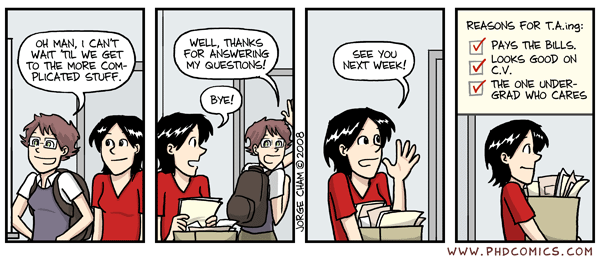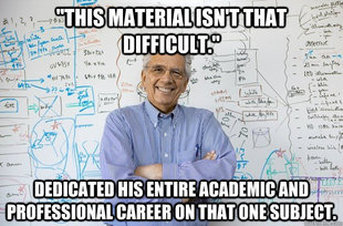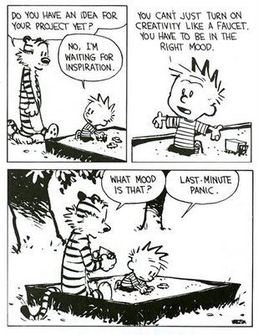What is a T.A.?
A Teaching Assistant (T.A.) is a graduate student who is paid by the university to assist a professor with coursework. They are almost always responsible for grading papers and exams, and sometimes help with giving lectures, running study sessions, writing test questions, and fielding students' questions regarding assignments.
Is a T.A. a Professor?
No. A T.A. is, however, an instructor and works with the professor to evaluate a student's performance over the semester. Usually, the T.A. is the liaison between student and professor, and is a more immediate source of help and clarification with assignments. T.A.'s are usually required to hold office hours, and can help you when your professor is who-knows-where at some obscure conference two days before the final exam.
How Do I Address My T.A.?
Typically, a T.A. will have you address them by their first name - they are not professors or Dr.'s (yet). And most T.A.'s are aware of their (lowly) positions and won't put on any airs about where they stand in the university hierarchy. However, they still merit the same formalities you would use when speaking with or writing to a professor.
So...Is the T.A., Like, A Friend?
T.A.'s might seem more friendly, approachable, and accessible than professors (although there are plenty of fantastic professors who also connect with their students) - but they are NOT your friend. Never (ever, ever, EVER) give your T.A. your phone number and tell them to text you, invite them to your dorm room or apartment, or ask them out on a date. You are being overly familiar and can get both you and your T.A. in serious trouble with the school.
Is the T.A. My Mortal Enemy?
No. I speak from experience when I say T.A.'s do not take home a stack of papers to grade with impish delight at the prospect squashing young students' hopes and dreams. It is, however, disheartening when nine students in a row think a single paragraph counts as an essay, or when they confuse something that happened in World War II with the Civil War, or when they can't even spell the professor's name correctly at the top of the page.
How Do I Get My T.A.To Like Me?
The same rules to get your professor to like you (or at least respect you) apply here: show up, do your homework, participate in class, respect their time, ask for help when needed, and use their office hours.
T.A.'s and professors actually work together on grading, either going over papers together or working from the same rubric. If you receive a poor grade from your T.A., chances are your professor agrees with it. Or might even deduct further points.
T.A.'s and professors actually work together on grading, either going over papers together or working from the same rubric. If you receive a poor grade from your T.A., chances are your professor agrees with it. Or might even deduct further points.
Bottom Line
Personally, being a T.A. was my favorite part of graduate school. I wished MORE students would have showed up to my office hours or asked for help. But I was not immune to becoming disillusioned with students when I saw sloppy papers, a disregard for deadlines, or the hastily concocted fantastical stories for why they missed a meeting or test.
Note: We know when you're lying about your printer spontaneously combusting / contracting a 17 hour deadly virus / your great aunt dying (again).
The best students to work with were those who understood how I served as an ally for them by giving them further insight into the professor's expectations.
A T.A. can be a great ally for students, both the exceptional and the struggling, since they have the ability to empathize with students while serving as an instructor.
Note: We know when you're lying about your printer spontaneously combusting / contracting a 17 hour deadly virus / your great aunt dying (again).
The best students to work with were those who understood how I served as an ally for them by giving them further insight into the professor's expectations.
A T.A. can be a great ally for students, both the exceptional and the struggling, since they have the ability to empathize with students while serving as an instructor.







